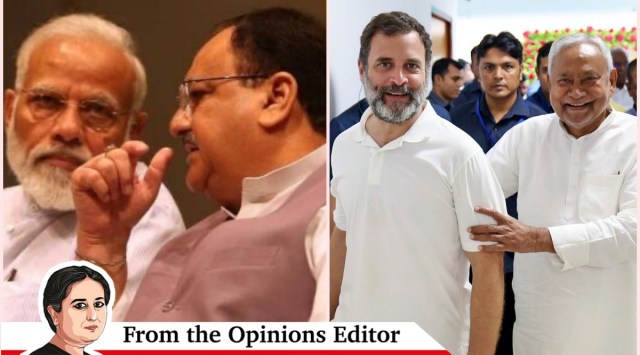
Dear Express Reader,
A politically eventful week is up ahead, with the Opposition meeting after Patna in Bengaluru, the BJP getting together with its old and new allies in Delhi, and the opening of the Monsoon Session of Parliament. The first two events are going to be keenly watched for how they shape and reshape the 2024 battlefield. The third, the Monsoon Session, will also make news not for the business Parliament conducts, or fails to, in terms of passing bills and hosting discussions, but for the staging ground it provides for skirmishes ahead of the main battle next year outside the House precincts.
The Modi-BJP, having relegated and emasculated the NDA for most of its second term, and after losing traditional, long-standing allies such as the SAD, Shiv Sena and JD(U), is now pivoting towards erstwhile and existing partners, as the Opposition’s unity efforts pick up urgency and pace. Meanwhile, the fact that Parliament has lost its place as a political arena in and of itself, that it is now only a place for shadow-boxing while the real debates and confrontations lie outside it, is no longer news.
An important sign that the BJP may be revising its stance on alliance-making is that PM Modi, who rarely participates in discussions in the House and is seldom seen on platforms and forums with other parties, will be present at the Delhi meeting. Across the fence, Sonia Gandhi is slated to attend the Bengaluru meet, which is perhaps the Congress’s acknowledgement of the need to put its best foot forward to get other parties to help it to take on the BJP.
For the BJP, the defeat in Karnataka may have been a cautionary tale, if not a turning point, in terms of its strategy vis a vis allies in 2024. Its victory in Karnataka has brought the Congress back into a game that, with its top leader disqualified from fighting the next election, it is still too whittled down to fight on its own nationally.
In this backdrop, this session of Parliament will be watched, most of all, for the journey of the legislation to replace the Centre’s Delhi ordinance. The ordinance had gone against a Supreme Court decision in taking away powers from the elected government and handing them, in effect, to the Lieutenant Governor and bureaucrats in a newly constituted National Capital Civil Service Authority.
With the Congress publicly coming out against the ordinance, the Opposition phalanx in support of the AAP’s cause has just been shored up — but the numbers game in the Rajya Sabha, where no party or formation has a majority, remains open. In general, the BJP is better placed than the Opposition to make up the deficit in numbers in the Upper House — quite simply, it is much better armed, with both carrot and stick, vis a vis fence-sitters and smaller parties.
And yet, on the ordinance, ahead of 2024, a new frisson of uncertainty could unsettle expectations, and make this monsoon session more dramatic than it otherwise would have been.
Given the spectres of centralisation stoked by the Centre’s ordinance in an election year, regional parties being wooed by the BJP, and even those like the BJD or TDP which have supported the BJP off and on, more on than off, might be reluctant to be seen on its side. At the very least, they may see this as a good opportunity, ahead of 2024, to drive a hard bargain with the BJP. Many parliamentary strategies are open to these players, including abstaining, and they will be watched for the one they pick.
An ordinance that should have been extensively debated and discussed in Parliament because of the fundamental challenge it poses to federalism’s first principles will, in all likelihood, end up as a trigger for a bare-knuckled game of pre-poll positioning.
The Uniform Civil Code may also enter Parliament in this session or the next one, and that should be a reason to worry. The UCC treads complex social and cultural terrain and it needs nuanced and layered responses that will be difficult to frame by players with an eye on the coming polls.
Having said that, however, even without an imminent election bearing down on it, Parliament has failed to function as a spacious deliberative space for some time now. While the decline has several complicities, which straddle all sides of the political fence, it has been especially and glaringly severe on the Modi government’s watch.
Bills are passed in a hurry, and their scrutiny by parliamentary committees has come down to a paltry 13 per cent. About four out of every 10 bills passed are ordinances. The last eight consecutive sessions of Parliament were adjourned sine die before the scheduled date of closure.
The short shrift to debate and scrutiny of legislation by committees, the avoidance of discussions on issues of national importance, are now part of the larger and longer crisis that this parliamentary session is only poised to perpetuate.
Meanwhile, the issues continue to line up at the House door for a hearing — from the intolerable toll taken by the rail accident to the hardening edges in Manipur.
Till next week,
Vandita
Must Read Opinions from the week:
– Amitabh Sinha “Moon is a milestone”, July 15
– Ganesh Devy, “On UCC, intent matters”, July 14
– Nikhil De and Aruna Roy, “Separate rights from freebies”, July 14